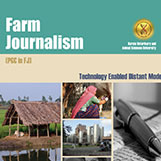Livestock, Agriculture and the allied fields are transposing its roles in the changing context of
the world- specific to the time, territory and technology. It is important that the professionals working
in these sectors are able to realize the changes so as to contribute their potentials in a meaningful
manner. Quite often our professionals working in the sector are hesitant in taking decisions, or
reluctant to lead in the changing scenario for want of a holistic understanding on the livestock- agri
sector. As the globe witness the accelerated pace of the technologies sweeping through sectors and
redefining the humans of the present day in terms of technology- man, Livestock and agri- sector is
also not spared. Today’s society is product of networking, biotechnology and globalization. It is
important that our practicing professionals understand, learn and apply knowledge on these changes
and its contribute to a sustainable world.
The efforts of KVASU, true to its motto of “ ideas in action” as a higher learning Centre is
now engaging in meeting the aspirations of a different set of learners. The concern for the University
for many of those professionals is evident from our humble effort of disseminating the knowledge to
learners who are often busy in their own livelihood activity, do not have time to come to a centre
regularly and undergo a formal education course. But as mentioned earlier the changes are vital to be
understood if the Livestock-agri sector has to be sustainable and enterprising. This suitability is not
only relevant and significant to the farmers but also to the humanity which is ensuring Food security
as the new Mantra. Poverty alleviation, mitigating malnutrition and dignified meal for health are
different sides of this sustainability. Entrepreneurship-approach contributes to Food security. The
course on Live stock Agri-entrepreneurship is designed with care to incorporate the less visible but
crucial elements in farming venture. Climate change, liberalization, biotechnological implications,
application of ICTs, import export regulations, IPR are some of the examples of the content that
matters, which you can explore through this course. Considering the powerful part of the media ,
efforts are made to redefine the role of journalism in rural development especially in agriculture.
Knowledge needed for these are worked out in the course on Farm Journalism.
The University has opted for the technology enabled mode of learning for these courses.
Regular interactions and discussions are to enrich the semester-wise learning process. The ultimate
aim of these courses is not to focus on “examination system” but on an “ education system” that can
carve out the best practices in the learners of our course. As the first batch of students of the courses I
have great privilege in welcoming you to be a participant in the University’s new endeavour of
reaching the needy. These are the first two courses under the Distance Learning Centre of the
Directorate of Entrepreneurship. I also take this opportunity to appreciate the Course Director of these
two courses who had taken keen interest and worked incessantly to make these courses a reality.
Wish you a great learning experience.
Director of Entreneurship







